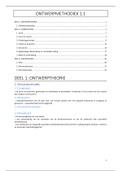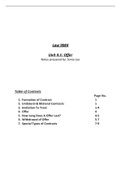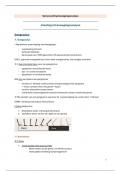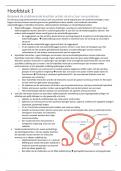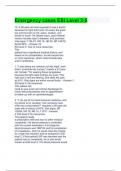ALGEMENE PSYCHOLOGIE
Inhoud
1.2 Ontwikkelingen die de psychologie mogelijk gemaakt hebben .............................................. 5
1.2.1 Ontwikkelingen in de filosofie ............................................................................................. 5
1.3. De beginjaren van de psychologie........................................................................................... 8
Psychologische scholen ................................................................................................................... 8
1. Hedendaagse psychologie ......................................................................................................... 10
Hedendaagse psychologie ............................................................................................................. 11
1.4. Onderzoeksmethoden ........................................................................................................... 11
De wetenschappelijke methode .................................................................................................... 11
2.1. Leren ....................................................................................................................................... 16
2.2. Drie vormen van leren: ........................................................................................................... 16
2.2.1. Klassieke conditionering ...................................................................................................... 16
2.2.2. Operante conditionering ..................................................................................................... 22
2.2.3. Observerend leren............................................................................................................... 30
Deel 1: Emotie ................................................................................................................................... 31
3.3. Componenten van emotie................................................................................................. 31
3.4. Emotietheorieën................................................................................................................ 31
Hoe gaan we prikkels verwerken? Verschillende theorieën hierover: ......................................... 31
3.5. Lichamelijke component van emotie ................................................................................ 34
3.6. Emotionele expressie ........................................................................................................ 36
Deel 2: Motivatie ............................................................................................................................... 38
Motivatietheorieën ........................................................................................................................... 39
3.7. Behoeftentheorieën .......................................................................................................... 39
3.8. Doelentheorieën................................................................................................................ 41
3.8.1. Goal- setting theory (Locke & Latham, 1990) ............................................................... 41
3.8.2. Conflicterende motivaties ............................................................................................. 42
3.8.3. Prestatiemotivatie ......................................................................................................... 42
3.8.4. Effect van omgeving ...................................................................................................... 42
4.1. Gemeenschappelijk ............................................................................................................... 43
4.1.1. Psychoanalyse ............................................................................................................... 43
4.1.2. Humanistische psychologie ........................................................................................... 48
4.1.3. Behaviorisme en cognitieve psychologie ...................................................................... 49
4.2. Verschillen ............................................................................................................................. 50
4.2.1. Persoonlijkheidstypes.................................................................................................... 50
4.2.1.1. Vier temperamenten ..................................................................................................... 50
4.2.1.2. Typologie van Sheldon................................................................................................... 50
1
, ALGEMENE PSYCHOLOGIE
4.2.1.3. Myers-briggs Type Indicator (MBTI) .......................................................................... 51
4.2.2. Trekbenadering ............................................................................................................. 52
4.3. Persoonlijkheidsstoornis ................................................................................................... 54
5.1. Gewaarwording vs. waarneming ........................................................................................... 55
5.1.1. Waarneming is een actief proces .................................................................................. 55
5.2. Theorieën van waarneming................................................................................................... 58
5.2.1. Computationele theorie van Marr ................................................................................ 59
5.2.2. Cilinders van Marr ......................................................................................................... 60
5.2.3. Geons van Biederman ................................................................................................... 60
5.2.4. Patroon- en objectherkenning ...................................................................................... 60
5.3. Waarneming beweging ......................................................................................................... 62
6.1. Selectieve aandacht............................................................................................................... 63
6.2. Verdeelde aandacht .............................................................................................................. 67
6.3. Bewustzijn ............................................................................................................................. 69
6.4. Slaap .................................................................................................................................. 70
6.5. Hypnose ............................................................................................................................. 74
7.1. Achtergrond....................................................................................................................... 74
7.1.1. De remiscentiebult ........................................................................................................ 74
7.1.2. De bevindingen van Ebbinghaus in de 19de eeuw ........................................................ 75
7.2. Geheugenmodel Atkinson & Shiffrin ................................................................................. 75
7.2.1. Sensorisch register ........................................................................................................ 75
7.2.2. KTG (Kortetermijngeheugen) ........................................................................................ 76
7.2.3. LTG (langetermijngeheugen) ......................................................................................... 77
7.2.3.1. Impliciet geheugen .................................................................................................... 78
7.2.3.2. Expliciet geheugen..................................................................................................... 78
7.3. Hoe het geheugen verbeteren? ........................................................................................ 78
7.3.1. Drie stappen geheugenproces....................................................................................... 78
7.3.2. Vergeten ........................................................................................................................ 81
7.3.2.1. Interferentie bij het oproepen .................................................................................. 81
8. Intelligentie................................................................................................................................ 82
8.1. Analytische intelligentie .................................................................................................... 82
8.1.1. Ontwikkeling van intelligentietests ............................................................................... 82
8.1.2. Huidige intelligentietests............................................................................................... 83
8.1.3. Kenmerken van intelligentietests (Psychometrische benadering) ................................ 85
8.1.4. Structuur analytische intelligentie ................................................................................ 89
8.1.5. Stabiliteit IQ-scores ....................................................................................................... 89
2
, ALGEMENE PSYCHOLOGIE
8.2. Praktische intelligentie .......................................................................................................... 91
8.3. Sociale en emotionele intelligentie ....................................................................................... 91
9. Psychopathologie ...................................................................................................................... 93
9.1. Wat zijn mentale stoornissen? .......................................................................................... 93
9.2. Perspectieven van mentale stoornissen ........................................................................... 94
9.2.1. Biologisch perspectief ................................................................................................... 94
9.2.2. Psychologische perspectief ........................................................................................... 95
9.2.3. Sociale perspectief ........................................................................................................ 95
Biopsychosociaal model ................................................................................................................ 95
9.3. Mentale stoornissen classificeren ......................................................................................... 97
9.3.1. DSM classificatie ............................................................................................................ 97
9.3.2. Prevalentie..................................................................................................................... 97
9.3.3. Autismespectrumstoornis ............................................................................................. 98
9.4. Psychotische stoornissen ...................................................................................................... 99
9.4.1. Schizofrenie ................................................................................................................... 99
9.4.2. Types symptomen ......................................................................................................... 99
9.4.2.1. Positieve symptomen ................................................................................................ 99
9.4.2.2. Negatieve symptomen ............................................................................................ 100
9.5. Stemmingsstoornissen .................................................................................................... 101
9.5.1. Depressieve stoornis ................................................................................................... 101
9.5.2. Bipolaire stoornis......................................................................................................... 102
9.6. Angststoornissen en obsessieve-compulsieve stoornissen............................................. 103
9.6.1. Angststoornissen ......................................................................................................... 103
9.6.1.1. Specifieke fobie ....................................................................................................... 103
9.6.1.2. Sociale...................................................................................................................... 104
9.6.1.3. Veralgemeende ........................................................................................................... 104
9.6.1.4. Paniekstoornis ......................................................................................................... 105
9.6.2. Obsessief- compulsieve stoornis (OCS- OCD) .............................................................. 105
Tips: het lijkt makkelijke leerstof, maar het examen is redelijk moeilijk! Niet onhaalbaar, maar je
moet de leerstof wel echt goed beheersen! Herhaling en begrijpen zijn key! Dikke succes. Heb met
deze samenvatting een 19/20 gehaald :)
3
, ALGEMENE PSYCHOLOGIE
1. Wat is psychologie
Wat is psychologie?
• Psyche (ψυχή) = geest
• logie < logos (λόγος: woord, gedachte, rede) = gebied van studie
Welk beweringen zijn correct/fout?
Pasgeboren baby’s zijn quasi blind
Hypnose levert meer betrouwbare herinneringen op
Een leugendetector is 90 tot 95% accuraat in het detecteren van leugens
Mensen met schizofrenie hebben meer dan één persoonlijkheid
Na de geboorte maak je geen nieuwe hersencellen meer aan
➢ Alles is fout.
Dus waarom hebben we psychologie nodig? Tonen we a.d.h.v. illusies:
• Visuele illusies
o Als je dit ziet denk je waarschijnlijk dat de ene lijnstuk
korter is dan het anders, dit komt door de pijlen ➔
Muller illusie
o Zelfs als je de illusie kent ga je toch nog denken dat het
lijnstuk kort is.
De illusie is te sterk
Conclusie: Deze illusies tonen ons aan dat wat we denken niet altijd blijkt te kloppen. Onze intuïtie is
dikwijls fout (contra-intuïtief)
Wat is psychologie niet?
Lekenpsychologie:
➢ Volkswijsheden, genre “iedereen weet toch dat..”
➢ Speculeren over de menselijke aard
➢ Gezond verstand, intuïtie
Pseudopsychologie:
➢ Niet-onderbouwde psychologische aannamen die zich als wetenschappelijke waarheid
voordoen (grafologie, astrologie)
Grafologie
4
Inhoud
1.2 Ontwikkelingen die de psychologie mogelijk gemaakt hebben .............................................. 5
1.2.1 Ontwikkelingen in de filosofie ............................................................................................. 5
1.3. De beginjaren van de psychologie........................................................................................... 8
Psychologische scholen ................................................................................................................... 8
1. Hedendaagse psychologie ......................................................................................................... 10
Hedendaagse psychologie ............................................................................................................. 11
1.4. Onderzoeksmethoden ........................................................................................................... 11
De wetenschappelijke methode .................................................................................................... 11
2.1. Leren ....................................................................................................................................... 16
2.2. Drie vormen van leren: ........................................................................................................... 16
2.2.1. Klassieke conditionering ...................................................................................................... 16
2.2.2. Operante conditionering ..................................................................................................... 22
2.2.3. Observerend leren............................................................................................................... 30
Deel 1: Emotie ................................................................................................................................... 31
3.3. Componenten van emotie................................................................................................. 31
3.4. Emotietheorieën................................................................................................................ 31
Hoe gaan we prikkels verwerken? Verschillende theorieën hierover: ......................................... 31
3.5. Lichamelijke component van emotie ................................................................................ 34
3.6. Emotionele expressie ........................................................................................................ 36
Deel 2: Motivatie ............................................................................................................................... 38
Motivatietheorieën ........................................................................................................................... 39
3.7. Behoeftentheorieën .......................................................................................................... 39
3.8. Doelentheorieën................................................................................................................ 41
3.8.1. Goal- setting theory (Locke & Latham, 1990) ............................................................... 41
3.8.2. Conflicterende motivaties ............................................................................................. 42
3.8.3. Prestatiemotivatie ......................................................................................................... 42
3.8.4. Effect van omgeving ...................................................................................................... 42
4.1. Gemeenschappelijk ............................................................................................................... 43
4.1.1. Psychoanalyse ............................................................................................................... 43
4.1.2. Humanistische psychologie ........................................................................................... 48
4.1.3. Behaviorisme en cognitieve psychologie ...................................................................... 49
4.2. Verschillen ............................................................................................................................. 50
4.2.1. Persoonlijkheidstypes.................................................................................................... 50
4.2.1.1. Vier temperamenten ..................................................................................................... 50
4.2.1.2. Typologie van Sheldon................................................................................................... 50
1
, ALGEMENE PSYCHOLOGIE
4.2.1.3. Myers-briggs Type Indicator (MBTI) .......................................................................... 51
4.2.2. Trekbenadering ............................................................................................................. 52
4.3. Persoonlijkheidsstoornis ................................................................................................... 54
5.1. Gewaarwording vs. waarneming ........................................................................................... 55
5.1.1. Waarneming is een actief proces .................................................................................. 55
5.2. Theorieën van waarneming................................................................................................... 58
5.2.1. Computationele theorie van Marr ................................................................................ 59
5.2.2. Cilinders van Marr ......................................................................................................... 60
5.2.3. Geons van Biederman ................................................................................................... 60
5.2.4. Patroon- en objectherkenning ...................................................................................... 60
5.3. Waarneming beweging ......................................................................................................... 62
6.1. Selectieve aandacht............................................................................................................... 63
6.2. Verdeelde aandacht .............................................................................................................. 67
6.3. Bewustzijn ............................................................................................................................. 69
6.4. Slaap .................................................................................................................................. 70
6.5. Hypnose ............................................................................................................................. 74
7.1. Achtergrond....................................................................................................................... 74
7.1.1. De remiscentiebult ........................................................................................................ 74
7.1.2. De bevindingen van Ebbinghaus in de 19de eeuw ........................................................ 75
7.2. Geheugenmodel Atkinson & Shiffrin ................................................................................. 75
7.2.1. Sensorisch register ........................................................................................................ 75
7.2.2. KTG (Kortetermijngeheugen) ........................................................................................ 76
7.2.3. LTG (langetermijngeheugen) ......................................................................................... 77
7.2.3.1. Impliciet geheugen .................................................................................................... 78
7.2.3.2. Expliciet geheugen..................................................................................................... 78
7.3. Hoe het geheugen verbeteren? ........................................................................................ 78
7.3.1. Drie stappen geheugenproces....................................................................................... 78
7.3.2. Vergeten ........................................................................................................................ 81
7.3.2.1. Interferentie bij het oproepen .................................................................................. 81
8. Intelligentie................................................................................................................................ 82
8.1. Analytische intelligentie .................................................................................................... 82
8.1.1. Ontwikkeling van intelligentietests ............................................................................... 82
8.1.2. Huidige intelligentietests............................................................................................... 83
8.1.3. Kenmerken van intelligentietests (Psychometrische benadering) ................................ 85
8.1.4. Structuur analytische intelligentie ................................................................................ 89
8.1.5. Stabiliteit IQ-scores ....................................................................................................... 89
2
, ALGEMENE PSYCHOLOGIE
8.2. Praktische intelligentie .......................................................................................................... 91
8.3. Sociale en emotionele intelligentie ....................................................................................... 91
9. Psychopathologie ...................................................................................................................... 93
9.1. Wat zijn mentale stoornissen? .......................................................................................... 93
9.2. Perspectieven van mentale stoornissen ........................................................................... 94
9.2.1. Biologisch perspectief ................................................................................................... 94
9.2.2. Psychologische perspectief ........................................................................................... 95
9.2.3. Sociale perspectief ........................................................................................................ 95
Biopsychosociaal model ................................................................................................................ 95
9.3. Mentale stoornissen classificeren ......................................................................................... 97
9.3.1. DSM classificatie ............................................................................................................ 97
9.3.2. Prevalentie..................................................................................................................... 97
9.3.3. Autismespectrumstoornis ............................................................................................. 98
9.4. Psychotische stoornissen ...................................................................................................... 99
9.4.1. Schizofrenie ................................................................................................................... 99
9.4.2. Types symptomen ......................................................................................................... 99
9.4.2.1. Positieve symptomen ................................................................................................ 99
9.4.2.2. Negatieve symptomen ............................................................................................ 100
9.5. Stemmingsstoornissen .................................................................................................... 101
9.5.1. Depressieve stoornis ................................................................................................... 101
9.5.2. Bipolaire stoornis......................................................................................................... 102
9.6. Angststoornissen en obsessieve-compulsieve stoornissen............................................. 103
9.6.1. Angststoornissen ......................................................................................................... 103
9.6.1.1. Specifieke fobie ....................................................................................................... 103
9.6.1.2. Sociale...................................................................................................................... 104
9.6.1.3. Veralgemeende ........................................................................................................... 104
9.6.1.4. Paniekstoornis ......................................................................................................... 105
9.6.2. Obsessief- compulsieve stoornis (OCS- OCD) .............................................................. 105
Tips: het lijkt makkelijke leerstof, maar het examen is redelijk moeilijk! Niet onhaalbaar, maar je
moet de leerstof wel echt goed beheersen! Herhaling en begrijpen zijn key! Dikke succes. Heb met
deze samenvatting een 19/20 gehaald :)
3
, ALGEMENE PSYCHOLOGIE
1. Wat is psychologie
Wat is psychologie?
• Psyche (ψυχή) = geest
• logie < logos (λόγος: woord, gedachte, rede) = gebied van studie
Welk beweringen zijn correct/fout?
Pasgeboren baby’s zijn quasi blind
Hypnose levert meer betrouwbare herinneringen op
Een leugendetector is 90 tot 95% accuraat in het detecteren van leugens
Mensen met schizofrenie hebben meer dan één persoonlijkheid
Na de geboorte maak je geen nieuwe hersencellen meer aan
➢ Alles is fout.
Dus waarom hebben we psychologie nodig? Tonen we a.d.h.v. illusies:
• Visuele illusies
o Als je dit ziet denk je waarschijnlijk dat de ene lijnstuk
korter is dan het anders, dit komt door de pijlen ➔
Muller illusie
o Zelfs als je de illusie kent ga je toch nog denken dat het
lijnstuk kort is.
De illusie is te sterk
Conclusie: Deze illusies tonen ons aan dat wat we denken niet altijd blijkt te kloppen. Onze intuïtie is
dikwijls fout (contra-intuïtief)
Wat is psychologie niet?
Lekenpsychologie:
➢ Volkswijsheden, genre “iedereen weet toch dat..”
➢ Speculeren over de menselijke aard
➢ Gezond verstand, intuïtie
Pseudopsychologie:
➢ Niet-onderbouwde psychologische aannamen die zich als wetenschappelijke waarheid
voordoen (grafologie, astrologie)
Grafologie
4

